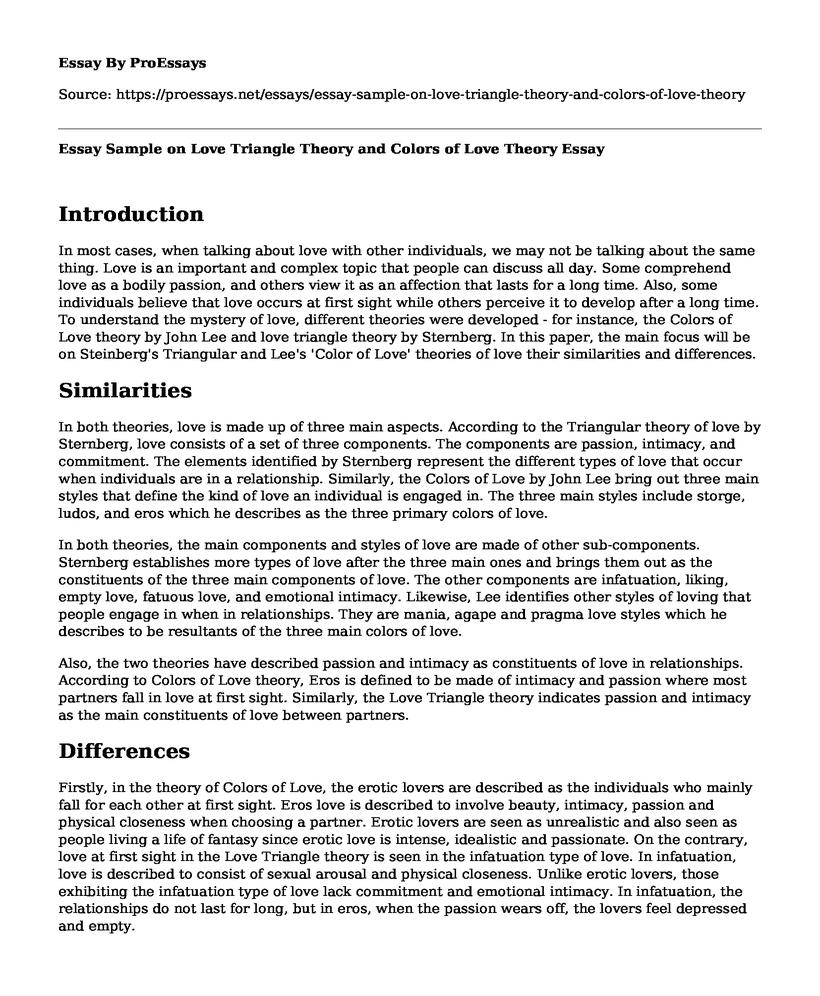Introduction
In most cases, when talking about love with other individuals, we may not be talking about the same thing. Love is an important and complex topic that people can discuss all day. Some comprehend love as a bodily passion, and others view it as an affection that lasts for a long time. Also, some individuals believe that love occurs at first sight while others perceive it to develop after a long time. To understand the mystery of love, different theories were developed - for instance, the Colors of Love theory by John Lee and love triangle theory by Sternberg. In this paper, the main focus will be on Steinberg's Triangular and Lee's 'Color of Love' theories of love their similarities and differences.
Similarities
In both theories, love is made up of three main aspects. According to the Triangular theory of love by Sternberg, love consists of a set of three components. The components are passion, intimacy, and commitment. The elements identified by Sternberg represent the different types of love that occur when individuals are in a relationship. Similarly, the Colors of Love by John Lee bring out three main styles that define the kind of love an individual is engaged in. The three main styles include storge, ludos, and eros which he describes as the three primary colors of love.
In both theories, the main components and styles of love are made of other sub-components. Sternberg establishes more types of love after the three main ones and brings them out as the constituents of the three main components of love. The other components are infatuation, liking, empty love, fatuous love, and emotional intimacy. Likewise, Lee identifies other styles of loving that people engage in when in relationships. They are mania, agape and pragma love styles which he describes to be resultants of the three main colors of love.
Also, the two theories have described passion and intimacy as constituents of love in relationships. According to Colors of Love theory, Eros is defined to be made of intimacy and passion where most partners fall in love at first sight. Similarly, the Love Triangle theory indicates passion and intimacy as the main constituents of love between partners.
Differences
Firstly, in the theory of Colors of Love, the erotic lovers are described as the individuals who mainly fall for each other at first sight. Eros love is described to involve beauty, intimacy, passion and physical closeness when choosing a partner. Erotic lovers are seen as unrealistic and also seen as people living a life of fantasy since erotic love is intense, idealistic and passionate. On the contrary, love at first sight in the Love Triangle theory is seen in the infatuation type of love. In infatuation, love is described to consist of sexual arousal and physical closeness. Unlike erotic lovers, those exhibiting the infatuation type of love lack commitment and emotional intimacy. In infatuation, the relationships do not last for long, but in eros, when the passion wears off, the lovers feel depressed and empty.
Secondly, the theory of love triangle focuses on explaining the different components of love. As a result of those constituents, people develop different types of love. For instance, Sternberg explains liking as a type of love in which individuals relate closely and trust each other, but they lack passion. Also, Sternberg describes romantic love as that which constitutes of passion for sex and emotional closeness. On the other hand; the Colors of love theory describe the methods by which people love each other which give various aspects of love. For instance, Lee describes ludus as love in which partners play out with different partners, and partners lack strong feelings for each other. Ludus love lacks emotional intensity, and the partners are manipulative. Lee also identifies another method of loving that evolves from a friendship, and it is called storge love. In this relationship, partners uphold trust and commitment for each other.
Conclusion
Love is a mystery that most people have little understanding about. However, Sternberg and Lee developed theories that explain love in different aspects. Sternberg developed the Love triangle theory in which he shows love to be made of different constituents like passion and intimacy. Lee, on the other hand, advanced the Colors of Love theory that explains different types of love based on modes of operations of the partners.
Cite this page
Essay Sample on Love Triangle Theory and Colors of Love Theory. (2022, Nov 05). Retrieved from https://proessays.net/essays/essay-sample-on-love-triangle-theory-and-colors-of-love-theory
If you are the original author of this essay and no longer wish to have it published on the ProEssays website, please click below to request its removal:
- Communication Strategy Campaign for Patients With Post-traumatic Stress Disorder (PTSD) - Essay Sample
- ISTJ: Introverted Thinkers With a Keen Sense of Duty - Essay Sample
- Essay Example on Truth in Social Sciences: A Critical Analysis
- Impulse Control Disorder: Common Among Ages, Genders, Lifestyles & Genes - Essay Sample
- Gifts: Attractive, Responsible, Fearsome Abilities - Book Review Sample
- Research Paper Sample on Risk of Falling High Among Adults Aged 65 and Above with Cognitive Decline
- How Social Media Affects Self-Image - Research Paper Sample







